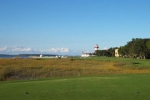By Jeffrey A. Rendall, Photos of Tom Lehman by Larry Lambrecht
KIAWAH ISLAND, SC – Everyone agrees, it takes guts to be a leader.
By its nature, a leadership role involves risks, and inevitably, criticisms, because a leader makes decisions on controversial topics where unanimous opinion is nearly impossible to achieve. And if those decisions are subject to public scrutiny, you’re opening up the process to the media and a bevy of armchair citizen aficionados more than willing to nit-pick every little imperfection or suspected ulterior motive that a leader might have. Still, a leader takes it all in stride, and comes back for more.
Such is the case for Roger Warren, Director of Golf at Kiawah Island Golf Resort. Warren recently took the oath of office to become President of the PGA of America, and as its leader, immediately came under fire for the PGA’s decision to tag Tom Lehman with the captaincy of the 2006 United States Ryder Cup team.
Just hours after the 2004 US team was blown out by the Europeans last October, already the critics were throwing out possible successors to Hal Sutton as captain. The new captain will have an awesome responsibility, they said, challenged with winning back the Cup that’s proved so elusive in recent competitions, with the United States losing four out of the last five sets of matches -- the lone exception being the dramatic come-from-behind victory at Brookline in 1999.
The speculators came up with some wild theories – Tiger Woods should be named playing co-captain (despite being only 30 years old in 2006), and his other co-captain should be his good friend Mark O’Meara, who certainly possesses the typical credentials for being named captain, but has stirred controversy in the past with comments about the nature of the Cup and what it means to the players.
Or, they said the PGA should break with tradition by naming a captain outside the usual criteria of a mid-to-late-forties current Tour player – someone like Champions Tour star Larry Nelson, who never got a chance to captain the Ryder Cup team, despite seeming to possess the requisite playing achievements for it.
Instead, Warren and the PGA tagged Lehman, and they’ve received some heat for it.
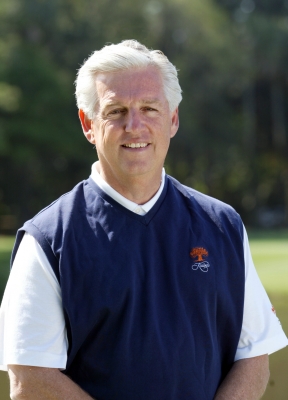 |
| Kiawah Island Golf Resort's Director of Golf, Roger Warren. |
Add to Warren’s responsibilities the need to bring new players into the game of golf itself, as well as fight to retain the ones who already play. Golf is struggling to grow – mostly because players are leaving the game as fast as they’re coming in. New thinking and energy is needed to solve the retention problem, as well as a host of other important issues facing the game of golf in the 21st century.
Happily, Warren seems up to the job. We caught up with him recently while preparing material on Kiawah Island, and he was more than willing to share his thoughts on the Ryder Cup Captain selection process, as well as lay out his ‘agenda’ for his two-year term as President of the PGA:
GTMA: First off, if you would, talk about the criteria used for selecting Tom Lehman as Captain of the 2006 US Ryder Cup team.
Warren: Well, I think the process for selecting the Ryder Cup Captain is something that’s been established for a long time, and we’re very proud of the quality of the captains that we’ve picked in the past. And Tom fits that same mold.
We look at someone who’s had Ryder Cup experience, and someone who’s had major tournament winning experience. But then we really get down to the leadership qualities that the person has demonstrated in the game – in their own game when they’ve played, and in their relationships with other players when they were on the Ryder Cup team.
So when we looked at Tom Lehman, it was clear that he was a person who really had the passion for the Ryder Cup, understands the challenges of being successful in a Ryder Cup, and has shown the leadership in his participation in the Ryder Cup in the past. We think that those characteristics are really going to serve him well -- and the team well -- as we go to Ireland and try to win back the Ryder Cup in 2006.
GTMA: How would you address the controversy in ‘passing over’ Larry Nelson for a chance at being the US Ryder Cup team captain?
Warren: We generally don’t talk about individuals who weren’t selected. We don’t talk about the process of evaluation or the individuals who were considered.
We just don’t think it’s appropriate to do that, and we won’t do that.
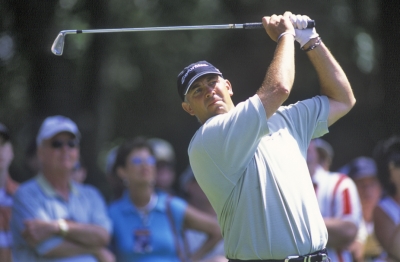 |
| The 2006 United States Ryder Cup Team Captain, Tom Lehman. Photo by Larry Lambrecht. |
At the same time, I would say that by the very nature of the fact we have so many great and qualified people -- of which a guy like Larry Nelson would be included in that group – we’re inevitably going to have some people who all of us would look at as deserving who don’t get selected.
We’re very proud of the process, and we feel very strongly that we’ve done a great job, and the captains we’ve selected have always done a great job, so the process works.
It’s just unfortunate that we can’t pick everybody.
GTMA: Do you think there’s ever going to be a captain who’s older than fifty?
Warren: I would say the opportunity for that exists -- it is something that we wouldn’t preclude.
It’s not a consideration right now. In the past, you’ve seen by who we’ve chosen that they’ve always been in an age frame between 44 and 48 or 49.
But I would say in future Ryder Cup selections, we’re going to go through the process of evaluating people, and I wouldn’t say that it’s impossible that that won’t happen.
GTMA: Do you think there was anything that could’ve been done before the last Cup, in terms of selecting the players, which would’ve made a difference?
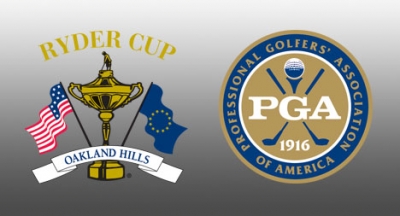 |
Warren: When you come right down to it, if you look at the team that we had there, and the quality and depth of players on the PGA Tour -- and you looked at the relative comparison rankings-wise between the two teams, nobody on paper would say that we could lose.
But that’s what’s so unique about the Ryder Cup. It only measures what happens in the three days of the event. And, in those three days, the Europeans outplayed the Americans in that event.
What we have to do in the future is continue to pick and put the best players that we can on the team, and hopefully have the captains and the teams continue to have the great chemistry that they do. Then, we need to get to the point where we play better than the Europeans.
Our goal is, in the next Ryder Cup, to put all those factors together and continue to put the best team with the best captain out there, and hope they play their butts off and win.
GTMA: The Europeans obviously have quite a few good players who aren’t full-time members of the European PGA Tour, yet still are able to qualify for the Ryder Cup Team. Last year, we had someone like Todd Hamilton who’d won several times in Japan, then comes to the PGA Tour and wins the British Open in his first full season, but couldn’t accumulate enough points to qualify for the US team.
Has there been any consideration to giving the American players who’re playing on some of the international tours – adding some points for their victories abroad?
Warren: I think what we’ll end up doing is going through and looking at the entire system, as we are right now, to determine what’s the most effective way to award points to assure that we get the best team.
(Ed. Note: Since we spoke with Mr. Warren, the new points system has been released by the PGA of America, and you can find it below, in the ‘details’ section.)
GTMA: From the perspective of the ‘aura’ of the Ryder Cup – do you think it’s become ‘larger than life?’
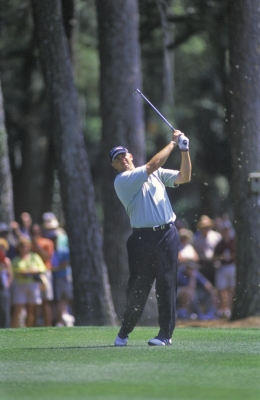 |
| Tom Lehman's played so well in early '05 that he may very well make his own team if he keeps it up. Photo by Larry Lambrecht. |
Warren: My view is the Ryder Cup is still the greatest golf event in the world.
It draws the most attention, the most excitement from golf fans. It’s one of the top sporting events in the world, and I think we’ve seen it through the past years, the interest that people have in it worldwide, is growing and the players, contrary to comments they make after the event, it is very important to them, very special, and I think it defines for them many times, their quality as a player and their ability to compete.
Because there really isn’t anything else like it, relative to the pressure they feel.
And these great players want those opportunities to prove their greatness. And I think that the Ryder Cup will continue to be a venue in which great players will have that opportunity.
GTMA: From a general curiosity standpoint – in the President’s Cup there are more matches, so more of the teams’ players get to play more often – whereas in the Ryder Cup, some players don’t play until the singles matches on Sunday. Do you think there’s any chance that the Ryder Cup is going to add some more matches to get more of the team members involved in the entire event?
Warren: I think that the Ryder Cup, in the format that it’s traditionally used, has established itself over an extensive history as being a format that is good for the event, and the people enjoy it.
I think we’re going to continue to go forward with the existing format.
GTMA: Switching gears a bit, now that you’re President of the PGA of America, there are some issues facing the health of the game of golf.
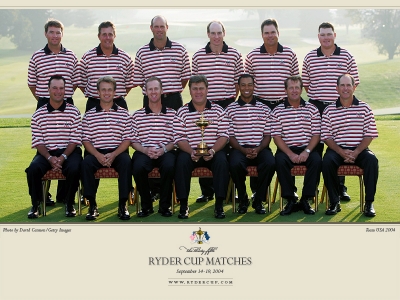 |
| The 2004 US Ryder Cup Team. Photo from the Ryder Cup website. |
From the PGA’s standpoint, from the golf professional’s standpoint, how do we bring more people into the game?
Warren: Well, certainly the program we established last year, called ‘Play Golf America’ – is something we can utilize to try and bring adults who’ve played in the past back into the game, and also to get adults into the game who haven’t played before.
That program was pretty successful in its first season -- we know we brought about 1.6 million people into or back into the game last year.
But the solution, through programs like ‘Play Golf America,’ is still going to be a function of individual golf professionals and individual golf facilities making efforts to bring new players into their clubs, getting them involved, getting them excited, teach them, help them develop an enthusiasm for the game.
And you’re seeing a growing commitment around the country for people that do that. And I think we’re on the right track… We’re starting to see a turn. I think the game will continue to grow, it’s a great game that people love to play. I see nothing but bright spots on the horizon for us.
GTMA: Can you describe ‘Play Golf America?’
Warren: ‘Play Golf America’ is a program where we’ll drive people through Public Service Announcements and advertising to www.PlayGolfAmerica.com. And, if you’re a player who wants to get involved with the game or get lessons, you go to www.PlayGolfAmerica.com and enter in your zip code.
Based on your zip code, golf courses in your area that have ‘Play Golf America’ programs will show up, according to the area you live. It’ll list a contact person and a point where you can call that golf course and get involved in a program that’s designed to bring people in, and get them acclimated to the experience if they haven’t been in the game before.
If they have been involved in the past, then it’s designed to get them back and provide them with a clinic or a lesson to involve them in the game again, through a contact.
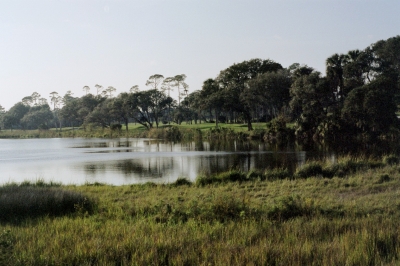 |
| When he's not acting as President of the PGA, Warren's at Kiawah Island Resort -- definitely a nice place to work. Photo by Kevin Gaydosh. |
GTMA: Is it strictly through teaching programs?
Warren: It’s also geared to try and get people involved in leagues, 9-hole play, family play… it’s a program, which across the breadth of it, provides people with different playing options.
For example, here at Kiawah Island, we held a family tee program this past year in June, July and August and on holidays -- and we generated 3,000 incremental new rounds with people and families playing golf after 6:00 pm at night. So we know these types of programs work.
We also did a ‘Play Golf America’ introductory program for beginners -- adults who have never played – and we had 500 people go through the course. We basically took them through the entire process, from the point they walk onto a golf course to the end, when they leave at the end of the day.
Where should they go, who they talk to, how they sign up, what they do to get a tee time, etc. Basically, Golf 101 – to help people get comfortable with it, and understand what they have to do.
GTMA: Is it only for beginners or people coming back to the game?
Warren: It’s for all of us, up to maybe 35-40, 45 years old, who because of their careers and their jobs, have gone away from golf, and now they’ve got a renewed interest, and they’ve played before and we want to get ‘em back into the game.
We want to get ‘em excited, give ‘em some instruction, and get ‘em re-energized. It’s a multi-faceted program, geared at bringing adults back into the game.
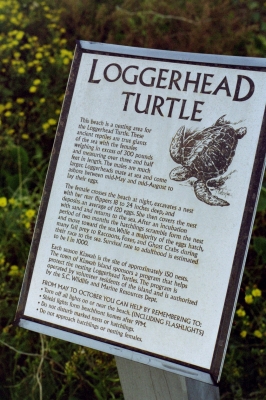 |
| Kiawah Island is a resort paradise, but it also minds the environment. The Loggerhead Turtle is one of many protected species on the island. Photo by Kevin Gaydosh. |
We know that the PGA of America and its members have done a great job with Junior Golf over time – those efforts continue, and will continue. Because Juniors are our investment in the future of this game.
But we’re really looking at a down time in the industry, and a resurgence – and we believe that’s going to be bringing adults back into the game who’ve gone away from it, and getting ‘em excited and get them playing again.
GTMA: What do you see as the major barriers to bringing those people back into the game?
Warren: Using our surveys as a reference, people see the time it takes to play as a major barrier to taking up golf. Another barrier is the fact that golf is a hard game, and they want to have fun with it -- so we need to make sure that we help them, through instruction, to get better at what they do.
There’s also a segment of it that says the cost of the game is too high.
So all those barriers have to be overcome, and the programs we’re creating are geared to be low-cost programs initially. Let’s get people playing nine holes or even six holes or three holes. Get them in leagues so they can play with people that they know.
GTMA: As far as the difficulty of the game is concerned, it seems all or most of the new courses being built these days are focusing on putting challenge in there for good players.
Obviously from the shorter tees the challenge is going to be somewhat less, but the game is difficult – do you think we should be designing some more player-friendly courses?
Warren: I think we should probably stop building golf courses for a while. I think we’ve got an over-supply of golf courses for the demand that we have.
 |
| PlayGolfAmerica.com's logo. |
I think if we’re going to do anything with golf courses, we ought to make sure that they are player-friendly. Part of that is creating shorter ‘golf courses within golf courses.’
Our family tee program is just a function of taking tees and putting them in the fairway, and letting people play from a shorter distance. I think that we need to shorten golf courses for people, to allow them to have success in scoring and have fun.
And I think that we can do that with the existing golf courses right now. I agree that some of the golf courses that have been built have been very difficult, but I think that we’re beginning to see that we need to make the golf courses a little easier so people can enjoy the challenge of golf.
GTMA: Would you say the PGA of America, in general, is in favor of all the equipment technology going on these days, as far as making it easier for people to hit it straighter and farther?
Warren: The reality of the equipment changes that have taken place – almost all the benefits have been derived by the elite player.
Only the best players are able to generate the club-head speed that allows the equipment and the balls to react the way they’re designed to. The average player today does get a little bit of an added advantage with the quality of the golf ball to hit it straighter. But if you look at scoring averages for the average player and their handicaps over the last ten years, they haven’t changed at all.
So I think, from a psychological standpoint, the equipment changes have been good for players. But I think the overall performance numbers don’t show that they’re really succeeding that much more.
In contrast, for the elite player, the quality of the equipment and the technological advancements has allowed him to really jump ahead. But they’re also much better trained and in much better physical condition – they’re bigger athletes than they were in golf in the past.
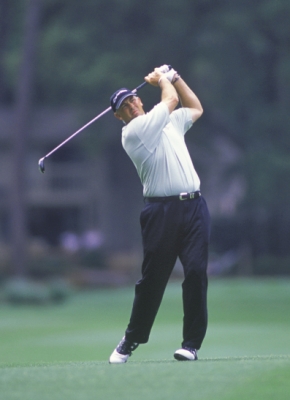 |
| Tom Lehman. |
Our goal with the average player is, with this equipment now -- we have to help them learn to swing the club a little bit better.
Most average players would be better off spending their extra money on lessons than going out and buying the most recent rage in a driver, or a set of new irons.
GTMA: Finally, what are your major goals as President of the PGA of America? What do you hope to accomplish?
Warren: My primary concern is ‘Play Golf America’ and continuing to grow participation in the game.
My secondary concern would be – we’ve established a new education/certification program for our members, and we’re going to start a new research initiative to allow them access to more accurate and valid numbers in terms of the performances of golf facilities and the businesses of golf.
We’re implementing a ten-year strategic plan as we go forward.
So my duty as President is to make sure that we move forward in the implementation of the ten-year strategic plan, that we continue our focus and drive on ‘Play Golf America,’ which will promote participation in the game, and in the end, to achieve the mission of the PGA of America -- which is to raise the standards of the profession and to increase participation in the game of golf.
If, at the end of the two years, it’s demonstrated that we’ve done that, then I’ll feel like I’ve been successful.
_________________________________________________
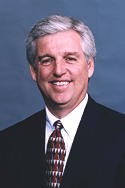 |
| Roger Warren, looking Presidential. |
You get the impression through talking with Warren that he’s incredibly dedicated to his profession that is golf, but also to teaching the game – which is understandable, considering he’s a former high school teacher who coached basketball and golf for eighteen years.
He brings a perspective to the game that probably isn’t the same as a career golf professional. That’ll no doubt help as the PGA moves forward in its efforts to grow the game, and provide us many more thrilling moments in the Ryder Cup.
Note: See the links below for more stories on Kiawah Island Golf Resort, where Warren demonstrates his leadership on a daily basis.
Details:
New Ryder Cup Points System (Borrowed from a Press Release from the PGA of
In Ryder Cup years, the points will increase to 375 for regular season event wins, up from 150 under the previous system and points for finishes in positions two through ten will be doubled. A major championship victory will be worth 675 points, compared to 300 under the previous system and points for positions two through ten will also be increased. Only the top-10 finishers in sanctioned events are eligible to earn points.
The leading 10 players in the Ryder Cup point standings following the 2006 PGA Championship will earn automatic Ryder Cup berths and the final two players to complete the 12-member team will be chosen by the U.S. Ryder Cup Captain Tom Lehman. The 2006 Ryder Cup Matches will be conducted Sept. 22-24, 2006, at The K Club in Straffan,
The PGA of America's points system, first introduced in 1947, made its last significant revision in 1993, which provided added weight to the major championships. The
Points are awarded for top-10 finishes at PGA Tour co-sponsored events as follows:
2004 Regular events: 75, 45, 40, 35, 30, 25, 20, 15, 10, 5
2005 Regular events: 75, 45, 40, 35, 30, 25, 20, 15, 10, 5
2005 Majors: 450, 135, 120, 105, 90, 75, 60, 45, 30, 15
2006 Regular events: 375, 90, 80, 70, 60, 50, 40, 30, 20, 10 2006 Majors: 675, 180, 160, 140, 120, 100, 80, 60, 40, 20
| Related Links | Comments on this article? | |
|
Maryland National Golf Club Hollow Creek Golf Club Rocky Gap Resort PB Dye Golf Club in Ijamsville Whiskey Creek Golf Club |
E-mail Jeff Rendall, Editor: jrendall@golftheunitedstates.com |







